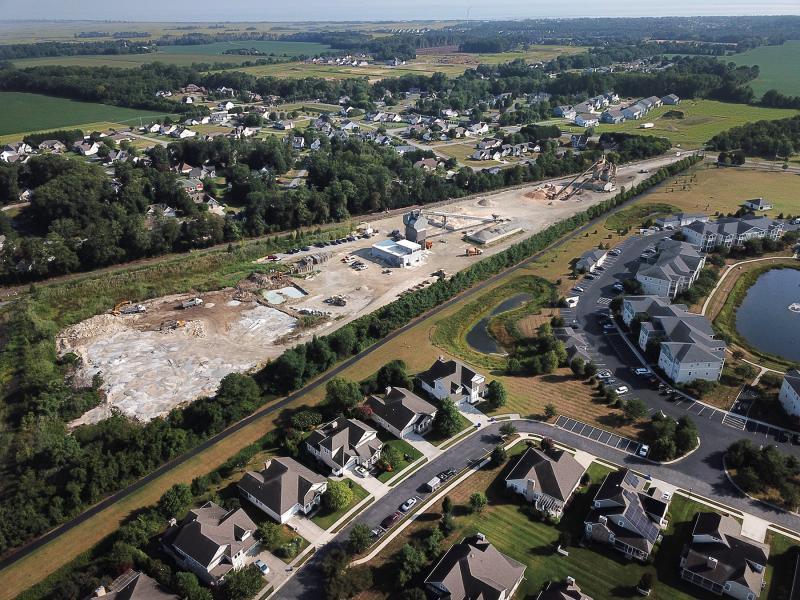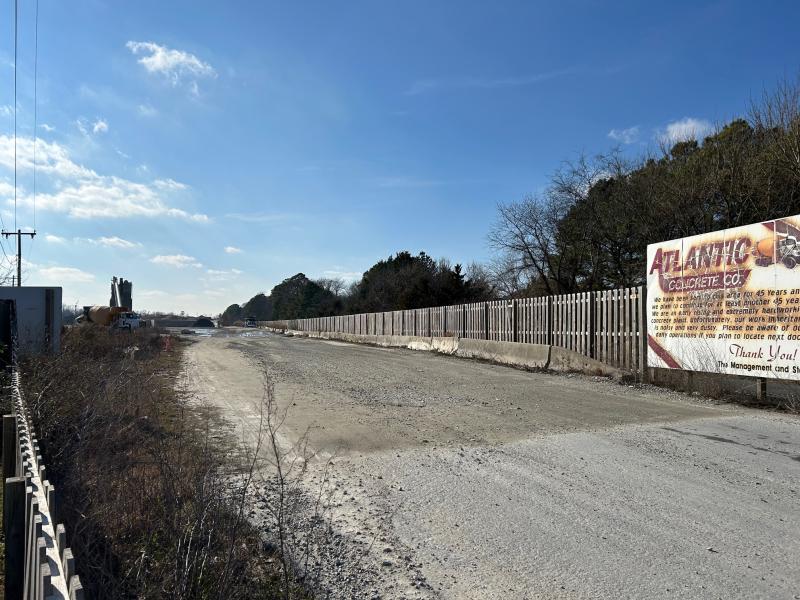Lewes resident files legal actions over Atlantic Concrete plant
A Lewes resident is continuing his legal fight with the county and a local concrete plant over operations located near his home.
Julian Karpoff, a resident of Villages of Five Points, has filed two separate lawsuits related to Atlantic Concrete running a concrete recycling operation on land adjacent to his house: one in Delaware Superior Court and the other in Delaware Court of Chancery.
Karpoff first filed suit against Atlantic Concrete in 2022 in the Court of Chancery. Atlantic Concrete has operated on a 4.97-acre piece of land on Old Orchard Road since 1970, and in 2001, it bought a second parcel between its main plant and the Villages of Five Points, which began development in 2003. Atlantic Concrete did not operate on the second parcel until June 2021, after Sussex County officials deemed the original parcel nonconforming.
On the second parcel, Atlantic Concrete began a concrete recycling operation, where the company dumped and broke cement using a pneumatic breaker device, which, according to court documents, “emits noise and vibration like a pile driver.” Operations would run from 7 a.m. to 3 p.m.
Karpoff claimed the breaker produced excessive noise and dust, and was generally disruptive to the Villages of Five Points residents closest to the facility. According to court documents, Karpoff first brought his complaints to Janelle Cornwell, director of Sussex County’s Department of Planning & Zoning at the time. He told Cornwell that Atlantic Concrete’s activities were a nonconforming use that Atlantic did not have an exception for. Shortly thereafter, Cornwell left the office and was replaced by Jamie Whitehouse.
In April 2022, Whitehouse ruled that Atlantic Concrete’s operations were a valid expansion of Atlantic’s preexisting land use. Karpoff appealed to the county board of adjustment, but the appeal was stayed. In July, Karpoff filed suit with the Court of Chancery, seeking to have the use of the site declared unlawful.
Sussex County, which was a defendant in the suit, sought to compel Karpoff to pick a venue, the court or the board of adjustment. Atlantic Concrete went one step further and asked for the suit to be dismissed. Karpoff, on the other hand, sought to move the case forward to discovery.
Chancery Court Master Selena Molina heard oral arguments in the case in November 2022 and ruled with Atlantic Concrete, granting the motion to dismiss, which rendered moot the county’s motion to compel.
In her decision, Molina said the proper venue to hear Karpoff’s case is the board of adjustment, and he should pursue his appeal there. She said the board can determine whether the use of the Atlantic Concrete property is nonconforming, and a parallel process with the board and the court is not necessary.
Karpoff’s appeal with the board has not been heard yet, which forms the first of Karpoff’s two lawsuits. In the first suit, Karpoff is asking for a writ of mandamus against the board, asking a judge to ask the board to move forward with the appeal, direct the county to provide Karpoff with a complete copy of the record, and allow Karpoff to subpoena witnesses and cross-examine the county’s witnesses.
“The concrete recycling process involves dumping residual cement on the ground behind my house. When the 5-acre parcel is full, which seems to take about six months, the resulting hardened concrete is pounded into basketball-sized chunks by a ‘skid breaker,’ which is like a jackhammer on steroids mounted on a front-end loader body,” Karpoff said. “The breaking process is like living next to a pile driver that never stops. The noise and vibration have impaired my enjoyment of my home and disturb my activities, such as reading and writing and my other hobbies. When the breaker is operating, the lamp shades on my desk shake visibly.”
Both Chip Guy, spokesman for Sussex County government, and Vince Robertson, county solicitor, said the county does not comment on pending or active litigation.
While his first suit is regarding how his appeal will be heard, Karpoff’s second suit, filed in Court of Chancery, claims that Atlantic Concrete is violating the Coastal Zone Act with its operations. The Delaware Department of Natural Resources and Environmental Control is also named in the suit. Karpoff said he sent a petition to DNREC Secretary Shawn Garvin with the signature of 160 nearby residents, but nothing was done.
“There are no permits for the concrete recycling operation, nor for the expansion of Atlantic's footprint onto the 5 acres where the concrete recycling is going on, which was previously a meadow, until 2022 when the recycling started,” Karpoff said.
David Hutt, attorney for Atlantic Concrete, said, “As this matter involves active and on-going litigation, Atlantic Concrete has no comment at this time.”
















































